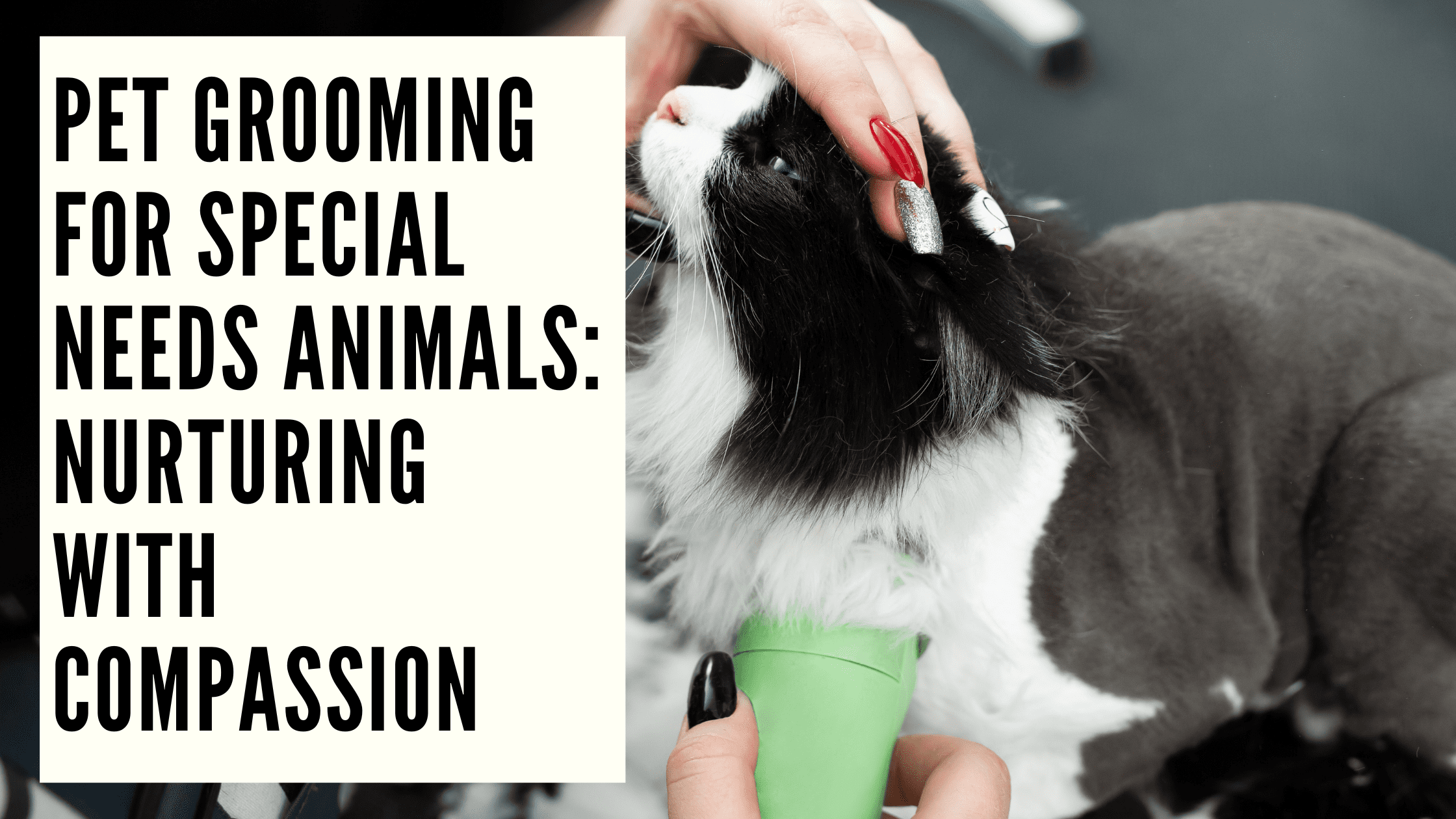Pet Grooming for Special Needs Animals: Nurturing with Compassion
Pet grooming is an essential aspect of responsible pet ownership, ensuring the health and well-being of our furry companions. However, when it comes to special needs animals, a tailored approach becomes crucial. This comprehensive guide aims to shed light on the nuances of grooming pets with special needs, emphasizing the significance of patience, empathy, and specialized techniques.
Understanding the Unique Needs of Special Needs Animals
Special needs animals encompass a diverse range of conditions, from physical disabilities to sensory sensitivities. Regular grooming routines might pose challenges for these pets, necessitating a more thoughtful and individualized approach. Recognizing the unique needs of these animals is the first step toward providing them with the care they deserve.
The Role of Patience and Gentle Handling
Grooming sessions can be stressful for special needs pets, making patience and gentle handling paramount. Groomers need to understand the pet’s cues, allowing them to adapt their approach accordingly. Taking the time to build trust and proceed at the pet’s pace can significantly contribute to a positive grooming experience.
Tailoring Grooming Tools for Special Needs Pets
Adapting grooming tools for specific conditions is crucial for ensuring the comfort and safety of special needs animals. Specialized brushes, clippers, and other grooming equipment designed with their unique requirements in mind can make a substantial difference in the grooming process.
Creating a Calm Environment
A calm and familiar environment is essential for special needs pets during grooming sessions. Groomers should pay attention to the setting, minimizing external stimuli that might cause stress. By creating a tranquil space, groomers can help pets relax and make the grooming experience more enjoyable.
Addressing Sensory Sensitivities
Many special needs animals have heightened sensory sensitivities, requiring groomers to be mindful of their touch, sound, and visual stimuli. Understanding and accommodating these sensitivities are crucial for a successful grooming session. Techniques such as introducing grooming tools gradually can help desensitize pets over time.
Building Trust and Bonding
Establishing trust between the pet and the groomer is foundational for a positive grooming experience. Groomers should invest time in building a strong bond with special needs animals, ensuring they feel secure and comfortable throughout the grooming process. This trust not only enhances the grooming experience but also contributes to the overall well-being of the pet.
Customized Grooming Plans for Different Conditions
Recognizing that different special needs require tailored approaches, groomers should customize grooming routines accordingly. Whether dealing with mobility issues, anxiety, or other conditions, adapting the grooming plan to suit each pet’s specific needs is essential for their comfort and safety.
Regular Checkups and Consultations
Frequent checkups are crucial for special needs pets to monitor their health and address any emerging issues promptly. Groomers should collaborate with veterinarians, forming a partnership to ensure the pet’s well-being. Regular consultations help refine grooming plans based on the pet’s evolving needs.
Educating Pet Owners
Empowering pet owners with knowledge is key to maintaining a special needs pet’s well-groomed appearance. Groomers should provide guidance on at-home care, offering tips and techniques to help pet owners manage grooming between professional sessions effectively.
Celebrating the Beauty of Diversity
Embracing the uniqueness of special needs animals is essential for changing perceptions. Groomers play a pivotal role in showcasing the beauty and individuality of these pets, fostering a positive and inclusive attitude toward diverse grooming needs.
Success Stories and Testimonials
Real-life success stories and testimonials from pet owners who have experienced positive grooming outcomes with their special needs animals can serve as inspiration. Sharing these stories highlights the impact of compassionate grooming and builds confidence in pet owners seeking specialized services.
Overcoming Challenges in Special Needs Pet Grooming
While specialized grooming is immensely rewarding, it comes with its challenges. Groomers may encounter obstacles unique to special needs pets. Addressing these challenges head-on and sharing strategies for overcoming them can benefit both novice and experienced groomers in this niche.
The Growing Demand for Specialized Pet Groomers
With an increasing awareness of the unique grooming needs of special animals, there is a growing demand for groomers with specialized skills. Those considering a career in pet grooming can explore opportunities in this niche, catering to the specific requirements of special needs pets.
Tips for Starting a Specialized Pet Grooming Business
For entrepreneurs interested in entering the specialized pet grooming industry, this section provides actionable tips. Building a clientele, establishing a reputable business, and creating a welcoming environment for special needs pets are crucial steps toward success in this niche.
Conclusion
In conclusion, pet grooming for special needs animals goes beyond the conventional approach. It requires compassion, patience, and a deep understanding of each pet’s unique requirements. By embracing diversity, building trust, and customizing grooming plans, groomers can contribute significantly to the well-being of special needs pets.
Frequently Asked Questions(FAQs)
1. How often should special needs pets undergo grooming sessions?
Grooming frequency depends on the pet’s specific needs and condition. Consult with a veterinarian to establish an appropriate schedule.
2. Are there grooming techniques suitable for pets with sensory issues?
Yes, grooming techniques can be adapted for pets with sensory sensitivities. Gradual introduction of grooming tools and a calm environment are key.
3. Can special needs pets be groomed at home?
With proper guidance from a professional groomer, pet owners can manage some grooming tasks at home. However, regular professional grooming is recommended.
4. What career opportunities are available in specialized pet grooming?
There is a growing demand for groomers with expertise in handling special needs animals. Opportunities include working in pet salons, starting a specialized grooming business, or collaborating with veterinarians.
5. How can I find a groomer experienced in special needs pet care?
Research local grooming services, read reviews, and ask for recommendations from veterinarians or pet communities to find a groomer with expertise in special needs pet care.

